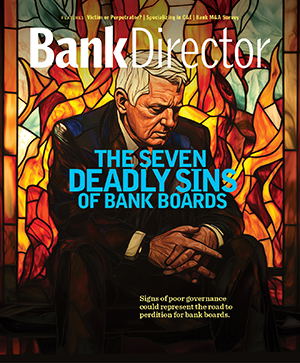
Market Intelligence
The Road Ahead
Bank stock returns improved in the second quarter, as investors got excited about the expected rise in the federal funds rate. Bank profitability in general should improve as interest rates rise. Bank net interest margins (basically the difference between a bank’s interest income and cost of funds divided by earning assets) are a key profitability indicator for banks. Margins have been under pressure for some time, declining yet again in the first quarter of 2015, according to the Federal Deposit Insurance Corp. Bank stock analyst David Long of Raymond James & Associates talks here about what he thinks will happen as rates rise.
What has been the impact of low rates on banks?
What is happening today on the asset size of the balance sheet, loans and investment securities each quarter are repricing lower than the portfolio yield going into the quarter. Asset yields continue to contract. On the liability side of the balance sheet, there is very little room for the banks to reduce their costs. Rates have been low for some time. Virtually all of the benefits on the liability side have been realized. Your net interest margins are going down.
How does that impact stock prices?
Performance of bank stocks has a high correlation to the 10-year Treasury [note]. When the 10-year Treasury [yield] rises, that foreshadows a rise in short-term rates. As of the end of last week, the 10-year Treasury yield was 62 basis points above its Jan. 15 low. Over the last three years, we’ve tracked 11 times where we’ve seen a sharp increase in the 10-year yield in a short period of time; in each of those 11 times the BKX [KBW stock index] outperformed the S&P 500, and the outperformance has been material. The 10-year yield rose 38 basis points from May 29 to June 10 [2015]. The BKX was up 4.6 percent and S&P 500 was down 0.1 percent.
What do you see happening when the Federal Reserve does raise interest rates?
The Fed will be pretty transparent and the market is unlikely to be surprised by a rate increase. Our expectation is that banks will outperform leading up to a rise in the federal funds rate and also outperform early in a rate hike cycle. The reason is, this time there will be a much greater improvement in bank profitability [than in past rate hikes].
What’s your favorite bank stock?
My favorite bank stock is SVB Financial, the parent company of Silicon Valley Bank, ticker SIBV. Regardless of the interest rate backdrop, they will produce strong revenue and earnings per share given loan growth in the bank. Secondly, they are one of the most asset sensitive of the banks. They have the most to gain from rising interest rates. Their core deposit base is very sticky and [is comprised] mostly of non-interest bearing deposits. In a scenario where rates move higher, we would expect very little change in that deposit base. The other component is Silicon Valley has about $35 billion in off balance sheet deposits that they are earning a very low return on today because of the low interest rate environment. As rates rise, the yield on that will rise. [SIVB’s off balance sheet deposits include money market funds for customers whose yields will improve as rates rise.]
David Long is a senior vice president and bank stock analyst for Raymond James & Associates.
The Road Behind
Back in March of 2015, Marty Mosby told Bank Director magazine he expected a consolidation wave at the end of 2016. We caught up with him three months later.
Q: Do you still feel there will be a consolidation wave in banking?
Yes, once the benefit from the rate rise has been absorbed, bank management won’t have that potential benefit to rely on over the strategic horizon, so partnering with a competitively advantaged bank will begin to look more attractive to those banks that survived the financial crisis but have not been able to ramp up enough organic growth. We expect a very modest rate increase, but even if it is only 100 basis points, it should be enough for the banks to recreate some positive spread in deposits. It won’t be as easy to count on further interest rate rises to improve returns going forward after 2016.
Marty Mosby is director of bank and equity strategies at Vining Sparks in Memphis, Tennessee.

Join OUr Community
Bank Director’s annual Bank Services Membership Program combines Bank Director’s extensive online library of director training materials, conferences, our quarterly publication, and access to FinXTech Connect.
Become a Member
Our commitment to those leaders who believe a strong board makes a strong bank never wavers.

